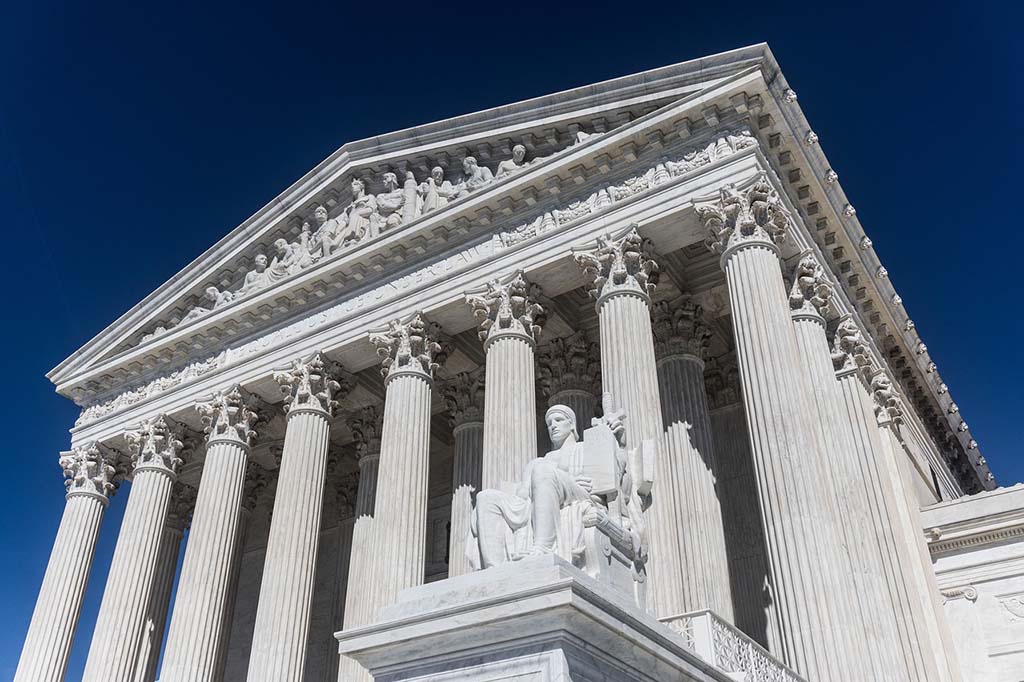Supreme Court Tees Up Big Tech ‘Must-Carry’ Challenges
Oral argument in content moderation-related cases set for February

The smarter way to stay on top of the streaming and OTT industry. Sign up below.
You are now subscribed
Your newsletter sign-up was successful
The Supreme Court has scheduled oral arguments on what tech companies are billing as their version of a challenge to “must-carry” laws, statutes that they say are unconstitutional threats to their First Amendment freedom.
The high court’s decision could determine the future of social media and other edge providers to moderate their content.
The court has scheduled combined oral argument for February 26 on Moody v. Netchoice (and CCIA) and Netchoice (and CCIA) v. Paxton. Those are legal challenges to similar Republican-backed Texas and Florida laws that would require websites to carry third-party content whether or not they wanted to.
The Texas law, which passed a Republican-controlled legislature in 2022, “prohibits an interactive computer service from censoring a user, a user’s expression, or a user's ability to receive the expression of another person based on ... the viewpoint of the user or another person.” It also requires large social media platforms like Facebook and Twitter to disclose how they manage content, to publish an acceptable-use policy that users can find telling them what content is acceptable, to publish quarterly transparency reports and to have a complaint system in place.
The Florida law, which was also passed by a Republican majority legislature, limits websites’ immunity from civil liability over third-party content under Section 230 of the Communications Decency Act of 1996. It removes that civil-liability protection for Big Tech platforms like Facebook or Twitter, including allowing for monetary damages up to $250,000 per day for deplatforming political candidates for statewide office,and $25,000 per day for candidates for nonstatewide offices.
The laws are in part a response to Republican claims that edge providers have been censoring conservative speech.
In response to the high court’s announcement of the oral argument calendar, the Computer & Communications Industry Association (CCIA), said that the challenged statutes “would force digital service providers to publish all third-party content, without editorial discretion, or face onerous regulatory burdens. These ‘must-carry’ laws violate the First Amendment by stripping private companies of their right to curate, organize, and display online content.”
Also Read: Court Says Texas Content Moderation Law Can Go Into Effect
If that argument sounds familiar, it was the one cable operators made to the court in Turner v. FCC, the 1994 court challenge to the FCC’s pay TV must-carry rules, which require cable operators to carry broadcast TV stations in their market whether or not they want to give up valuable channel space.
Cable operators said pay TV must-carry was an unconstitutional taking of their channel property, as well as government-compelled speech that undercut their editorial independence.
Also Read: Big Tech Says Texas Law is Big Mistake
CCIA branded the state laws as “must carry” even though the Supreme Court in Turner held that forced carriage passes constitutional muster if it furthers an important government interest and is narrowly tailored.
“The Constitution’s free speech right protects the editorial discretion of websites and digital services from government intervention,” CCIA president Matt Schruers said. ”Content moderation is not only an essential trust and safety function, it is a First Amendment-protected activity. After years of litigation, CCIA looks forward to having our constitutional challenges heard in the Supreme Court.”
The smarter way to stay on top of the streaming and OTT industry. Sign up below.
Contributing editor John Eggerton has been an editor and/or writer on media regulation, legislation and policy for over four decades, including covering the FCC, FTC, Congress, the major media trade associations, and the federal courts. In addition to Multichannel News and Broadcasting + Cable, his work has appeared in Radio World, TV Technology, TV Fax, This Week in Consumer Electronics, Variety and the Encyclopedia Britannica.

